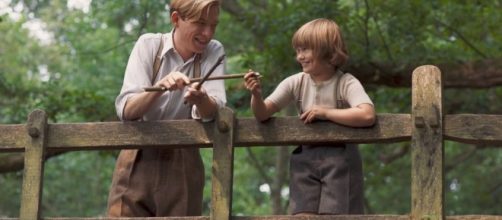The story of Aa Milne (played here by Domnhall Gleeson) finding his own self-worth and connection with his son through 'Winnie The Pooh,' with a greater focus on the stories themselves, could have made for a delightful one-hour Sunday special. While "Goodbye Christopher Robin" includes these elements, the attempts to transpose them into a wider, meaningful narrative sometimes fall flat.
The opening jumps between three different eras in as many minutes, and the transitions are jarring and abrupt in a way that needlessly disorientates the viewer.
Once the film has settled down, in East Sussex some issues that plague its running time develop.
It can be hard to care for the problems of someone for whom money is no issue and has Margot Robbie for a wife. The writers have solved this through showing Milne suffering from PTSD after serving at the Somme, though it's difficult to say how much it relates to the historical figure himself.
Milne was more the overt patriot that the film portrays, serving in the WWII Home Guard (not included in "Goodbye Christopher Robin") as well as the Western Front. He also managed to get his son into war even after he failed a medical, which is included in the film but doesn't fully delve into Milne's volte-face on an anti-war philosophy portrayed.
This impact of war on Milne plays a key role in the film, but it never quite fits smoothly into place. However, it is interesting to follow Milne's arc as he is tempted into the woods and childhood imagination by his son Christopher Robin (Will Tilston), and the best parts of the film come as he and his son play in the forests of Hartfield.
Something the film captures well is the origin of Winnie The Pooh in British quaintness, a far cry from the sugar-soaped creatures that exist today. Whatever "Goodbye Christopher Robin" is, it has avoided the misguided catastrophe of the upcoming "Peter Rabbi"t film.
Combining the magical world of Winnie The Pooh with reality was always a tall order
A highlight of the film is the relationship between Christopher Robin and his nanny (Kelly Macdonald).
Macdonald brings both a warmth and a quiet sadness to the role, and while Will Tilston is as vaguely annoying as most child actors it's possible to believe in a real connection with the pair.
Margot's Robbie's character doesn't work. She's a manipulative, self-interested harpy, more interested in the fame of her son than his development as a child. I'm sure some people with a familiarity with Daphne Milne may take an affront at this portrayal. From a story perspective, her early behavior can be assigned to post-natal depression, but in later scenes, she transforms also into a thinly developed antagonist to get knocked down by moralising characters.
East Sussex is a beautiful county, adoringly shot in "Goodbye Christopher Robin." While these woods are so important, and director Simon Curtis does try a few things to add variety, unfortunately, there does get to be a level of visual repetitiveness to all the trees and pooh sticks.
A sentimental event in the final act, referenced in the opening scenes, feels manipulative as the narrative is suddenly reversed. Yet in spite of flaws, "Goodbye Christopher Robin" can fleetingly capture the wonder of Winnie The Pooh and has genuinely heartfelt moments. It's also probably one more for the adults than the kids, which is unfortunate considering its subject matter. Although there is a clear sense of conclusion to the film, there is also talk of a sequel.
Rating: 2.5/5


